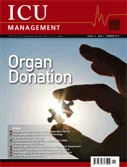
Editorial
Organ Donation
Author Jean-Louis Vincent Editor-in-Chief ICU Management Head Department of Intensive Care Erasme Hospital / Free,University of Brussels Brussels, Belgium [email protected] With thousands of patients dying from lack of donor organs every day, the topic of organ donation is a timely one. With ICUs often the location for the beginning of this process, our cover story focuses on this topic....
News
Industry and Research News
Supension of Hydroxyethyl-Starch Solutions to be Re-Examined The European Medicines Agency’s Pharmacovigilance Risk Assessment Committee (PRAC) has concluded that the benefits of infusion solutions containing hydroxyethyl-starch (HES) no longer outweigh their risks, and recommends that the marketing authorisations for these medicines be suspended. The review was triggered following three recent s...
Cover Story:Organ Donation
Donation as an Ethical Commitment in End-of-Life Care
Author Teresa Pont, MD, PhD Intensive Care Doctor and Transplant Coordinator University Hospital Vall d’Hebron Barcelona, Spain [email protected] Thousands of patients are waiting for the phone call announcing that they may have a chance to live longer, better, or just to live. Organ donation has changed the lives of millions by pushing the limits of medical treatment; limits that transce...
Optimal Management of the Potential Organ Donor Following Catastrophic Brain Injury
Author Jonathan Ball, MRCP EDIC FCCP FFICM MSc MD Consultant and Honorary Senior Lecturer in General and Neuro Intensive Care Care Group Lead, General ICU St George's Hospital and Medical School London, UK [email protected] This article presents best practice in organ donation, aimed at maximising organs that can be retrieved and optimising graft function and survival. Failure to optimise or...
The Ethics of Uncontrolled Organ Donation: Uncontrolled Organ Donation is Ethically Neutral
Author David Crippen, MD, FCCM Professor Departments of Critical Care Medicine and Neurological Surgery University of Pittsburgh Medical Center Pittsburgh,USA With a shortage of donor organs worldwide, measures are needed to improve rates of organ donation. In this paper Prof. David Crippen proposes that preserving organs for organ donation early on while awaiting consent is ethically neutral and...
Matrix Features
Intelligent Ventilation in the ICU: Technology Improving Patient Outcomes
Authors David M. Linton, MB ChB, FCA (SA), MPhil (Crit Care) Professor Medical Intensive Care Unit Hadassah-Hebrew University Medical Center Jerusalem, Israel Sigal Sviri, MD Medical Intensive Care Unit Hadassah-Hebrew University Medical Center Jerusalem, Israel Peter V. van Heerden, MD, PhD Medical Intensive Care Unit Hadassah-Hebrew University Medical Center Jerusalem, I...
Implementing the Helsinki Declaration on Safety in Anesthesiology in Europe
Author Sven Staender, MD Professor Department of Anaesthesia & Intensive Care Regional Hospital Maennedorf, Switzerland [email protected] Sven Staender (Chairman), on behalf of the EBA/ESA Task Force Patient Safety (Andrew Smith, Guttorm Brattebø, David Whitaker) The ESA Patient Safety Starter Kit was launched in June at Euroanaesthesia 2013. This article describes t...
Indirect Calorimetry: Research Tool or Essential Equipment?
Indirect calorimetry is usually presented as essential equipment to optimise nutrition. However, numerous flaws limit its use, and currently available devices are not sufficiently accurate for clinical use. Why Use an Indirect Calorimeter in the ICU? The magnitude of the caloric debt (the difference between energy expenditure (EE) and the caloric intake) has been strongly associated with the rate of compli...
The Ethics of Uncontrolled Organ Donation: Uncontrolled Donation after Circulatory
Author Leslie Whetstine, PhD Associate Professor Division of Humanities, Walsh University North Canton, Ohio,USA In a typical Uncontrolled Donation After Circulatory Determination of Death (DCDD) case, a patient is brought to the Emergency Department suffering a cardiac arrest, and all resuscitation techniques are initiated in order to save the individual’s life. When resuscitation fails, death i...
Respiratory monitoring,perioperative period
Respiratory monitoring in the perioperative period
A recent large prospective cohort study conducted on different types of surgery has demonstrated that the incidence of in-hospital mortality and postoperative pulmonary complications (PPCs)is relatively high. Moreover, PPCs are associated with prolonged hospital stay and higher hospital mortality (Pearse et al. 2012).Ongoing studies are trying to find effective strategies for improving outcome. A keystone...
Management
Delayed ICU Admission and its Impact on Mortality
Authors Jean Baptiste Lascarrou, MD Medical-Surgical Intensive Care Unit District Hospital Center La Roche Sur Yon, France [email protected] Jean Reignier, MD, PhD Medical-Surgical Intensive Care Unit District Hospital Center La Roche Sur Yon,France René Robert, MD, PhD Medical Intensive Care Unit University Hospital Poitiers,France For the ARCO Group Websit...
Interview
Sepsis in Critical Care
Professor Djillali Annane is Professor of Medicine and Dean of the Medical School at the University of Versailles, Paris. He is the director of the general intensive care unit at Raymond Poincaré, Assistance Publique Hôpitaux de Paris (APHP). The unit is the largest ICU at the University Hospital of Paris, and has 36 beds, half of them high intensity beds, and half step-down units. Prof. Annane is also D...
Country Focus:South Africa
Critical Care in South Africa
Critical care in South Africa is more developed than in other parts of Africa, but faces specific challenges, especially from infectious diseases. South Africa has the highest number of people infected with HIV in the world. TB is a particular health burden, and trauma from motor accidents and interpersonal violence is also prevalent. Social support is lacking and the country also has chronic health issues...
Critical Care 2013, Durban
Author Dr. Dean Gopalan The 11th World Federation of Societies of Intensive and Critical Care Medicine Congress will be held in South Africa for the first time later this year. ICU Management spoke to co- Chairs Dr. Dean Gopalan and Prof. Satish Bhagwanjee about what to expect. What’s New for Critical Care 2013? We hope to make it a truly ‘world’ conference encompassing issues and cha...
5 Comments

Christian Marolt

Christian Marolt




